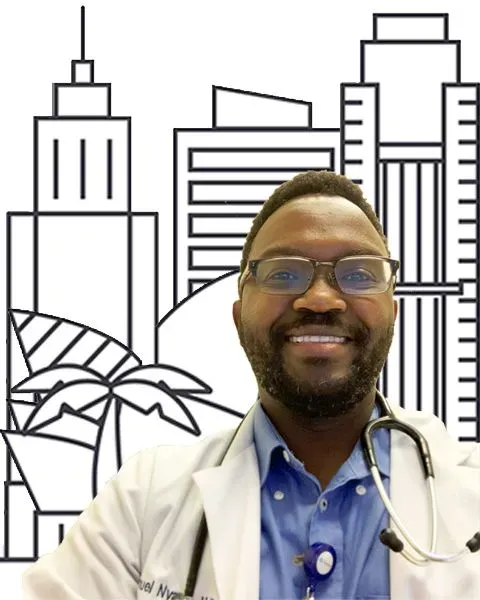
The Critical Need for More Black Physicians
Black History Month's 2022 theme – Black Health and Wellness — focuses on the importance of addressing racial inequities in healthcare.
February 10, 2022
Black History Month celebrates the achievements of people of African descent in American life. Its 2022 theme was Black Health and Wellness, as chosen by the Association for the Study of African American Life and History (ASALH).
ASALH, which is credited for founding Black History Month, selected this theme to celebrate the achievements of Black medical scholars and practitioners and to honor the ways Black communities have cared for their own physical and mental health in the face of racism.
When Black doctors treat Black patients, those patients experience better health and lower mortality. One widely reported study found that Black men who visited Black doctors were more likely to follow preventive health guidelines than when they saw white doctors.
The patients with Black doctors took more advantage of flu shots and diabetes screenings (47% more) and cholesterol screenings (72% more) than the patients randomly assigned white doctors.
The researchers stated that treatment by a Black doctor could result in significant reductions in the death rates among Black men for cardiovascular disease, cancer and HIV/AIDS.
State of Black Doctors Practicing in the United States
There is some recent positive news. An NPR story reported an unprecedented spike in the 2021-22 academic year in the number of first-year medical students who are Black — up 21%. And while that is encouraging, other statistics illustrate we have a long way to go.
A UCLA study found that the proportion of U.S. physicians who are Black has increased only 4 percentage points in 120 years, from 1.3% in 1900 to 5.4% in 2018. And according to a report in the New England Journal of Medicine, the number of people from underrepresented groups in medical schools declined in the 40 years between 1978 and 2019.
Why haven’t more Black students pursued careers in medicine? Systemic racism is the reason many experts give: Insufficient educational opportunities, weak support systems, lower incomes and scarcity of role models.
This lack of Black doctors contributes to inequities in healthcare that afflict communities of color, according to experts at the Rand Corp., a research organization. Studies have shown that Black patients treated by Black doctors do better and experience higher patient satisfaction.
Action with Intention Would Dismantle Barriers
The shortage of Black doctors also raises an alarm about the future. The American Association of Medical Colleges concluded in 2021 that the country needs between 102,400 and 180,400 more doctors to level rates of care between underserved populations and populations with fewer social, economic and geographic barriers.
The American Medical Association has said that the underrepresentation of Blacks in medicine – and what that means for patients – are problems that constitute a crisis and demand bold action.
According to Rand Corp. experts, “intentional recruitment” is needed to increase the number of Black doctors. Intentional recruitment involves expanding the criteria for selecting candidates for medical school and residencies and more programs to develop a more extensive pipeline of applicants.
Medical schools acknowledge the need to improve the mentorship of Black students and address the micro-aggressions they encounter throughout their professional training.
Health Systems Actively Supporting Communities of Color
The need for more Black doctors and better health services among communities of color are issues our partners are committed to addressing. For example:
-
Providence made a $50 million, five-year health equity pledge in 2020. They started with questioning and listening to 40 experienced caregivers and health equity advisors on their experiences with health disparities. The conversations put context around health inequities and will motivate action plans.
-
Facey Medical Group formed a Black Physicians Council in 2020 after the deaths of George Floyd and Breonna Taylor. This council strives to reduce health inequity in Black communities in California’s San Fernando, Santa Clarita and Simi valleys through education, conversation and advocacy for Black patients.
-
Comprehensive Community Health Centers operates six federally qualified health centers in Los Angeles. Its vision is to deliver “accessible, culturally appropriate, high quality health and wellness services” to the diverse communities it serves.
PS&D is honored to be in partnership with these health organizations.
Read more about Black History Month and Black health and wellness.
Check out the following resources:

